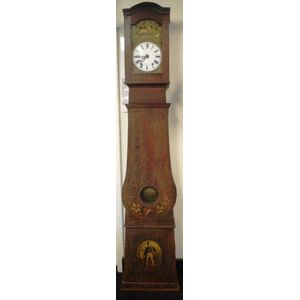French Banjo Long Case Clock with Striking Movement
You must be a subscriber, and be logged in to view price and dealer details.
Subscribe Now to view actual auction price for this item
When you subscribe, you have the option of setting the currency in which to display prices to $Au, $US, $NZ or Stg.
- Pendulum - The pendulum was discovered around 1602 by Galileo Galilei, and was adopted for time keeping by the Dutch mathematician and natural philosopher, Christiaan Huygens, who excelled in astronomy, physics, and horology.
The pendulum comprises a metal rod usually of brass or steel with a metal disk, known as a bob, at the end. The movement of the pendulum is driven by weights or a spring, and as a pendulum swings in a regular arc, it was found accuracy could be controlled to within a few seconds a week.
Timekeeping can be adjusted by changing the height of the bob on the rod, making the pendulum either swing slower or faster.
The disadvantage of the pendulum was that changes in temperature also changed the length of the pendulum, interfering with the accuracy of the clock, and so in the 18th century two types of mercurial pendulums were invented which countered the movement in the steel rod.
The pendulum was the world's most accurate timekeeping technology until the invention of the quartz clock, regulated by a quartz crystal, in 1927. - Movement - The technical name for the workings of a clock or watch, and does not include the dial or case.
This item has been included into following indexes:
Visually similar items

Pair of Staffordshire flat back spaniels

An Edwardian sterling silver mounted claret jug, 1907 Sheffield, with maker's mark for James Deakin & Sons, the jug of tapering form with an internal optic rib, with a plain collar and low dome lid with knop and a long bracket handle, a trellis cut frieze

A hand knotted woollen Sarouk runner in traditional Persian design. Length 420 cm. Width 87 cm

A Japanese porcelain pedestal & jardiniere, late 19th century. Total 80 cm
